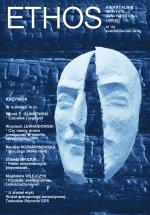 zobacz powiększenie | DOI 10.12887/31-2018-2-122-03 Witold P. GLINKOWSKI – Suffering as a Paradigm of Tischner’s Philosophy of Drama Cena brutto: 7,00 PLN za szt. |
|
The aim of the article is to indicate that suffering and pain are important categories in Józef Tischner’s philosophy of drama. In the philosophy of drama, which in this case is the philosophy of man, man is considered a subject defining himself in the horizon of good and evil. Human understanding of good is crucial here because man’s goal is to make his life valuable. Human life is defined as “thinking according to values,” in a broad sense of the term. Life understood this way runs in the context of axiological experiences. Without the experience of evil, man would be incapable of opening himself to goodness or of choosing goodness. However, evil is not the same as suffering. Evil poses a threat of the drama of man’s existence becoming a tragedy. However, evil, as opposed to suffering, has no power over man, because it involves man’s consent. In addition, suffering belongs to the monologic reality, while evil belongs to the dialogical and interpersonal reality. The difference between evil and suffering provides the foundation of Tischner’s philosophy of drama, in which man turns out to be a free and responsible subject. Keywords: Józef Tischner, suffering, pain, philosophy of drama, good and evil, thinking according to values, subjectivity, responsibility Contact: Katedra Filozofii Współczesnej, Instytut Filozofii, E-mail: witoldpiotrporycki@o2.pl Phone: +48 42 6356129; +48 508084712 http://filozof.uni.lodz.pl/staff/dr-hab-witold-glinkowski-prof-ul/ Pliki do pobrania: » 122_Glinkowski.pdf | |
